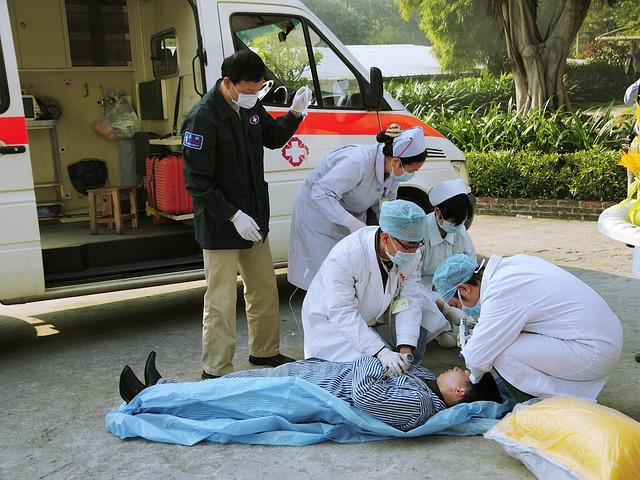As the tumultuous situation in Haiti continues to weigh heavily on the international community, discussions surrounding the deployment of foreign police forces are intensifying. In recent months, Kenya has emerged as a key player in the effort to restore stability to the Caribbean nation, fueled by a commitment to lend support amid escalating violence and civil unrest. Tho, as timelines and logistics surrounding this deployment become increasingly murky, questions arise about Kenya’s readiness and capability to fulfill this critical mission. This article delves into the current status of Kenya’s plans to send police officers to Haiti, examining the strategic implications, potential challenges, and the broader international response to Haiti’s plight. As the world watches, the extent to which Kenya can navigate these complexities will not only shape the future of Haiti but also redefine Kenya’s role in international peacekeeping efforts.
Kenya’s Commitment to Haiti: Assessing the Current Situation

Kenya’s decision to send police officers to Haiti signifies a significant international partnership aimed at addressing the ongoing challenges in the Caribbean nation. Following a request from the Haitian government, the Kenyan authorities affirmed their willingness to contribute to peacekeeping efforts in a country grappling with escalating violence and political instability. The deployment is perceived not only as a humanitarian gesture but also as an effort to restore order and support the Haitian National Police.Key elements driving this commitment include:
- Strengthening security: The increasing gang violence has necessitated urgent assistance from international forces.
- Supporting local governance: The presence of Kenyan officers aims to assist in stabilizing the government structures.
- Fostering international cooperation: Kenya’s action highlights a commitment to global peace and security.
As discussions continue regarding logistics and the full scope of this mission, it is crucial to assess how challenges such as funding, training, and the potential integration of Kenyan forces with existing Haitian security initiatives will be addressed. The Kenyan government has proposed deploying a contingent of around 1,000 officers, which has raised questions about the sustainability and efficacy of such a decision in the volatile environment of Haiti.To facilitate understanding of these deployments, the following table outlines the proposed timeline and key components of the mission:
| Phase | Timeline | Objectives |
|---|---|---|
| Readiness and Training | Q1 2024 | Equip officers for deployment conditions |
| Deployment to Haiti | Q2 2024 | Initiate operations in coordination with local forces |
| Evaluation and Adjustment | Q3 2024 | Review effectiveness and operational strategies |
The Strategic Importance of Police Deployment in Haiti

The current situation in Haiti underscores the critical role of police deployment as the nation grapples with increasing violence and political instability. With local law enforcement struggling to maintain order, the presence of a foreign police force can serve multiple strategic purposes, including restoring public safety, providing stability for humanitarian efforts, and fostering an environment conducive to political dialog. By projecting an image of renewed security, such deployments can lead to enhanced community trust and cooperation, paving the way for long-term peace-building initiatives.
Moreover, police deployment can help to strengthen international cooperation among nations concerned with regional stability. Countries like Kenya that are considering sending officers to Haiti engage in a broader dialogue on security enforcement and capacity building. The benefits of such missions extend beyond immediate law enforcement; they include training, mentoring, and equipping local police forces to respond effectively to crime and civil unrest. The essential outcome is to lay the foundation for self-sustaining security mechanisms within Haiti,which will ultimately contribute to a more resilient society.
challenges and Obstacles Facing Kenyan Troops

The deployment of Kenyan troops to Haiti has been hindered by several multifaceted challenges and obstacles that have emerged in recent discussions. Firstly, logistical hurdles present a significant barrier, encompassing the need for adequate transportation and supply chains to ensure that forces are effectively equipped upon arrival.moreover, the security situation in Haiti continues to evolve, with increasing gang violence and civil unrest posing dangers that could jeopardize both the operation and the safety of the deployed personnel. This necessitates careful risk assessments and contingency planning before initiation.
In addition to logistical and security issues, there are also diplomatic considerations that could influence the deployment. Kenya must navigate international relations both with Haiti and within the United Nations framework, as coordination among allied nations is essential for the mission’s success. Other potential obstacles include the need for local community support in Haiti, which is critical for operational effectiveness.Thus, fostering trust and communication with local leaders and populations will be crucial in overcoming these challenges:
| Obstacle | Description |
|---|---|
| Logistical Challenges | Limited transportation and supply chain issues affecting deployment readiness. |
| Security Risks | Rising gang violence and civil unrest could pose threats to personnel. |
| Diplomatic Relations | Need for coordination with international partners and compliance with UN mandates. |
| Community Support | Engaging with local leaders to foster trust and operational cooperation. |
International Response and Aid Coordination

The deployment of police officers to Haiti has prompted a significant international dialogue on security and humanitarian aid. Countries and organizations around the world are actively discussing their roles in stabilizing the nation, which has been plagued by violence and political instability. Notably,the United Nations and the Caribbean Community (CARICOM) have called for consolidated efforts to address these urgent issues. In response, Kenya has committed to sending a contingent of officers, positioning itself as a leader in regional peacekeeping initiatives.
Coordination efforts are crucial as various nations consider their contributions to restoring order in Haiti. Some of the primary focuses include:
- Logistical support: Ensuring that police units have the necessary resources for effective deployment.
- Training programs: Assisting local law enforcement agencies to strengthen their capabilities.
- Community engagement: Building trust and cooperation between police forces and local populations.
As countries come together, they are establishing a structured approach to aid coordination, which can be illustrated in the following table:
| Country/Association | Type of Aid | Status |
|---|---|---|
| Kenya | Police Deployment | Confirmed |
| United States | Logistical Support | Under Discussion |
| Canada | Training Programs | Proposed |
| United Nations | Monitoring and Evaluation | In progress |
The effectiveness of these combined efforts will play a pivotal role in shaping Haiti’s immediate future, as all parties work collectively towards fostering stability and enhancing the safety of its citizens.
Recommendations for a Successful Mission

To ensure the successful deployment of police officers to Haiti, various strategies should be carefully considered. Coordination with local authorities is crucial, as it builds trust and improves operational effectiveness.Establishing a clear communication channel with the Haitian government can facilitate a smoother integration of Kenyan officers into the local law enforcement framework. Furthermore, cultural sensitivity training for the officers can equip them with the necessary skills to navigate the local environment and foster positive relationships with the community they are tasked to serve.
In addition to enhancing local engagement, it’s essential to implement a robust logistical plan that addresses the unique challenges of the Haitian context. This includes ensuring the availability of adequate resources such as vehicles and communication systems. A thorough risk assessment should also be conducted to identify potential obstacles and develop mitigation strategies. To track progress and adapt strategies effectively, establishing key performance indicators (KPIs) will enable stakeholders to monitor the mission’s effectiveness in real-time.
| Focus Area | Recommendations |
|---|---|
| Local Coordination | Engage with Haitian government and community leaders |
| Cultural Training | Conduct workshops on local customs and language |
| Logistics | Ensure availability of resources and communication tools |
| Risk Management | Perform continuous risk assessments |
| Performance Monitoring | Set and evaluate key performance indicators |
Future implications for Kenyan Foreign Policy and Regional Stability

The potential deployment of Kenyan police officers to Haiti carries significant implications for the country’s foreign policy and its role in regional stability. This initiative could signify a shift towards a more proactive posture in international peacekeeping, especially in unrest-prone areas. Kenya’s involvement in Haiti could result in the following outcomes:
- Increased diplomatic clout: this move could enhance Kenya’s standing within international organizations, showcasing its commitment to global peace and security.
- Strengthened regional partnerships: Collaborating with other nations in peacekeeping missions fosters stronger ties with regional allies and could lead to coordinated efforts addressing local security challenges.
- Domestic repercussions: Engaging in foreign deployments may spark discussions on governance, resource allocation, and national security priorities back home.
Furthermore, this deployment may also influence regional dynamics. Kenya’s role in Haiti could set a precedent for African nations taking the lead in international policing, reflecting a shift towards African solutions for African problems. Possible implications for regional stability include:
| implication | Description |
|---|---|
| Enhanced credibility of African forces | Success in Haiti may bolster the perceived effectiveness of African-led initiatives globally. |
| Internal alignments | The deployment may encourage neighboring countries to bolster their police and military capacities in response to worsening local security conditions. |
| Shifts in regional alliances | A focus on collective security may lead to new partnerships among East African nations,promoting a more united front against transnational threats. |
Key Takeaways
the potential deployment of Kenyan police officers to Haiti remains a topic of significant interest and complexity.As the Caribbean nation grapples with ongoing political instability and security challenges, the international community closely monitors Kenya’s commitment and readiness to assist. The Kenyan government’s assertions of dedication to this mission must be weighed against both logistical realities and broader geopolitical implications. as developments unfold, it will be critical to observe how this situation evolves and what it ultimately means for the safety and stability of Haiti, as well as for Kenya’s role on the global stage. The coming weeks will be pivotal in determining whether this bold initiative can translate into effective support for a nation in dire need of help.







